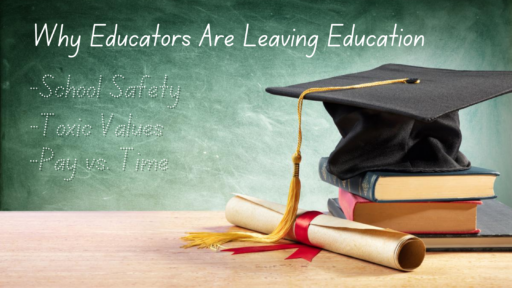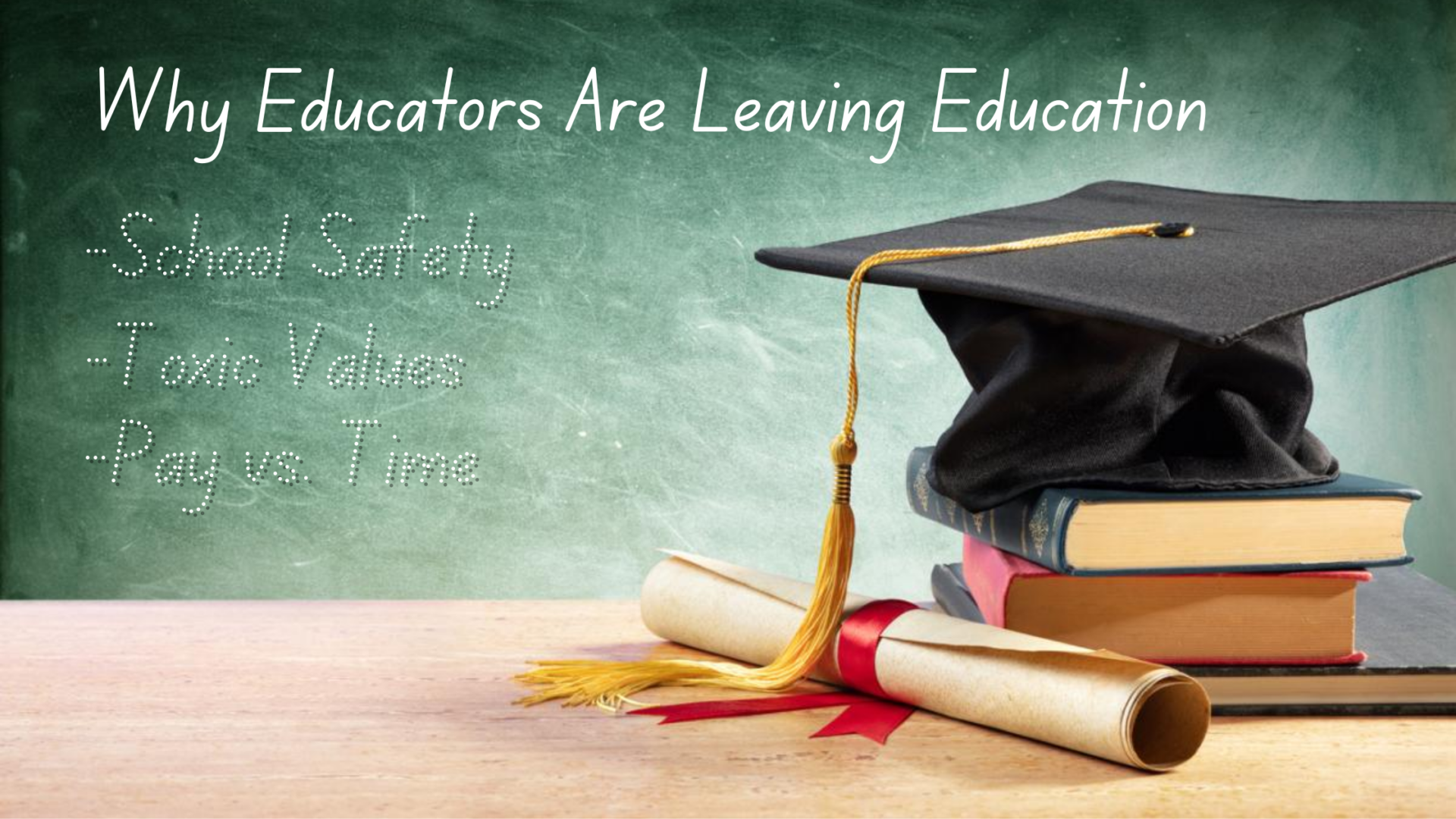In Part 1 (Student Perspective) of this discussion we talked about some of the biggest gaps that students have in their education when they graduate from high school. We understand that the gaps in education are not a result of the teachers, as they are forced to follow highly scrupulous curriculums in order to pass tests that are mandated by the bureaucrats overseeing them. This is a very high level view into the problems that the educators experience on a daily basis, but there are also so many additional challenges they are faced with every single day. As a result of the rules and regulations, thousands upon thousands of educators are simply opting to walk away from the profession entirely, perpetuating the problem for students – and we can’t really blame the educators at all. This is their story and what has come as a result of the consistent ignorance from the educational bodies that are supposed to support them.
Educators Are Leaving To Profession in Record Numbers
Thankless. Exhausting. Brutal. Undervalued. Unsafe. Unaffordable. These are just a few of the adjectives that educators are using to describe the current landscape of their job. We have allowed education to get to a place where the very people responsible for building the heart and soul of our future generations are recognizing that its no longer sustainable. Many educators have multiple jobs or side gigs, not by choice, but because its entirely unaffordable to live off the single income stream as a teacher. I’ve heard story after story of educators that are spending 60 to 70 hours a week just to “do right by the students”, while almost all hours after 40 are unpaid. Partner-teacher meetings, curriculum development, grading papers and one on one tutoring are all done outside of the normal working hours. This is obviously showing itself to not be sustainable and we are in desperate need of a solution. Before we can find a solution, we need to really dig deep into the problems educators are facing on a daily basis. Strap in because we aren’t holding anything back.
Safety In Schools Shouldn’t Be Controversial
Educators are expected to be the authoritative figure in a classroom if anything happens that may put their students in jeopardy. This includes handling disruptive students, locking down the classroom in the event of an intruder, or breaking up fights should they occur. With the radical increase in school shootings, they are even expected to protect students in the event something like this occurs. As if teaching students isn’t hard enough, we have built a culture that expects educators to wear entirely different hats at the drop of the pin and protect 30+ students.
With the rise of violence between school age students with fights, gun violence and discriminatory bullying the safety of educators is being swept under the rug. In a place where educators are expected to help and prepare students in their respective subjects we are seeing the influence of the outside world more and more prevalent in the classroom. The problem falls squarely on two groups of people: School administrators who has spent years being too soft on problematic students, and Parents not raising kids in a way that teaches them to respect educators and leaders. These two groups who have such a crucial role in the early developmental years of students has fallen short of their responsibilities, which create unsafe environment for educators. The results is educators questioning “Is my life and safety worth the money or relationships I build here.” For many, they stay for the relationships with their students and impact they can have but the truth is that many feel incredibly unsafe and once they realize their support system won’t do anything to make it better, they decide its time to go.
Toxic Values Are Being Forced On Impressionable Students
We have hundreds of examples of school boards making decisions about very polarizing topics being taught in schools. To make matters worse, these topics are shielded from parents making curriculums inaccessible. For parents that continue to push to get their information that their students are mandated to learn, there have been numerous arrests made for “problematic, anti-ally” behaviors. ON top of that, when educators stand up to say “I will not be teaching that to my students,” they get labeled bigots, misogynistic or hateful.
The truth of the matter is that these educators are people too and have their own views and values for what they believe should be taught in the classroom setting. It feels like in recent years these conversations has strayed so far from the core subjects that are being taught to students, focusing on propaganda that is being pushed in classrooms. Where are the days were students are learning about these core subjects in schools, and values are taught at home? Why are we forcing perspectives on these students, versus helping them become the most knowledgeable individuals possible?
Quality educators are tired of being forced to teach these polarizing topics that are rooted in nothing more than fear for losing their jobs. While this doesn’t impact all educators, as the decisions are on a district-level the infiltration of these toxic mindsets is growing and educators are taking a stand by leaving sending the message – If you want to poison the minds of students, do it without us. After all, school is where students spend the majority of their life in the first 18 years making the messaging and delivery of very topics very impactful for their development.
Compensation Rates Leave Educators Overworked And Undervalued
While this one isn’t surprising to anyone, the education system is fundamentally flawed from a compensatory standpoint. This is a wide-breathed problem, as there are so many potential reasons for this, but the result is the same no matter the excuse. I’m going to go a bit off -script here but want to provide a few questions to help you understand where we are coming from while discussing this problem.
- Why is it that educators are expected to have a Masters degree to teacher, but have an average salary 23.3% lower that other professions with a masters degree? [1][2]
- Why are schools wasting money on hard copy textbooks to the tune of $250 per student per year? [3] (This figure is from 2017, and has likely climbed as a result of inflation)
- Why do we need so many school administrators and why do they make so much money? [4].
The masters degree situation is one that is really startling to me. The average college student graduates their respective undergraduate program with $30,500 in debt. [5] Then to get a masters in education on average, will increase the debt an additional $52,878. [6] So just to get the basic qualifications needed for these educational professional will often leave a debt total of $83,378 – leaving a monthly payment in the ballpark of $890-$1,200. How is this sustainable by any means?
With the rapid advancement in technology, schools have become more technologically advanced, but they still use hard textbooks versus online resources. These textbooks become very problematic, as they cost a fortune and in most subject are outdated the second they are put into print. Using the 2017 figures (which have almost certainly climbed higher), and the average number of students enrolled in schools being 526 [7], we approximate schools are spending roughly $131,500 a year on outdated textbooks that are recycled in just a few years. With an average of 80.7 teachers per school in the US [8], that would represent a potential increase of $1,629.49 per year for educators.
Lastly, why are there so many school administrators? Superintendent, Vice Superintendent, Principal, Vice Principals, Dean of Students, Transportation Supervisors, etc. The education system is so disgustingly over bloated that the basic necessities needed to help students succeed are put on the back burners. We see teachers that have such a vested interest in their student success that they spend their own money on basic classroom supplies. We have these large groups of professionals making large sums of money that have no direct impact on the improvement or development of schools systems. It seems like we have forgotten that schools are in place for the benefit of students. We are treating schools like businesses, and while there is budgeting that is needed to operate a school safely and effectively, at what point does the madness stop?
As a result of all this mess, and many more examples, educators are done/ They are hitting their breaking points and people are leaving across the United States daily for a variety of reasons. The education system is in dire need of transformation, but there is little to no accountability and the governing bodies are just as guilt of reaping the fruits of teachers labor, so why change it? What happens when we have too many students and not enough teachers? Schools close, safety is jeopardized and we start a vicious death spiral that hurts the student, and the future of our country.
Do better education system. Educators, you are the blessings and we support you. Keep up the good work, but if it gets to be too much, we understand.
Do you have any stories about this playing out in your world? Please let us know. Send an email to contact@prototopics.com to share your story. We’d love to hear it!









